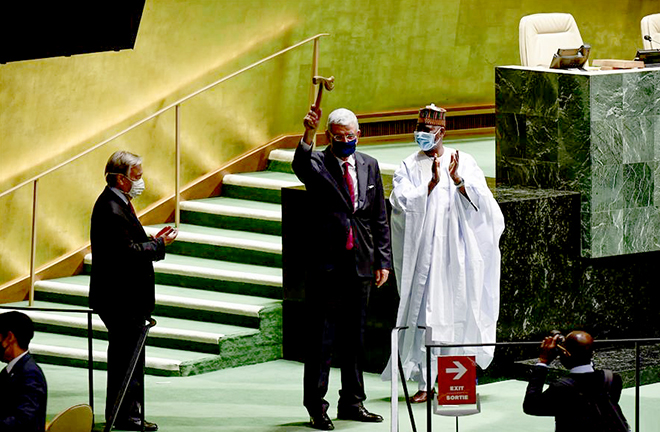Countries with different social systems can coexist

The 75th session of the UN General Assembly was declared open by new General Assembly President Volkan Bozkir on Sept. 15, 2020. Photo: XINHUA
This year marks the 75th anniversary of our victory in the World Anti-Fascist War and the founding of the United Nations (UN). In his video statement at the general debate of the 75th session of the United Nations General Assembly, Chinese President Xi Jinping pointed out that the high-level meeting to commemorate the 75th anniversary of the UN was significant as it reaffirmed our abiding commitment to the purposes and principles of the UN Charter on the basis of reviewing historical experiences and lessons from the World Anti-Fascist War. Bearing in mind the history and warning future generations to pursue healthier international relations is the purpose for our commemoration of the victory of the World Anti-Fascist War.
The birth of the UN followed the victory of World War II, and the anti-Fascist alliance's cooperative efforts. Over the past 75 years, the UN's status kept improving as their role grew in response to increasing global need. Since the 1970s, as the legitimate seat of the People’s Republic of China was restored in the UN, particularly as more developing countries joined, the UN has taken on a new look. UN membership has increased from 51 to 193. As a multilateral arena, and a base for maintaining peace and development, the status and role of the UN cannot be replaced by any other international organization, and it has won the support of the overwhelming majority of countries. In addition, the World Bank, the International Monetary Fund (IMF), the World Health Organization (WHO) and the United Nations Educational, Scientific and Cultural Organization (UNESCO) play important roles within their respective areas of expertise. Since its founding, WHO has played a critical role in coordinating global health affairs.
The UN also faces the heavy task of reform, as it needs to keep pace with the times. In face of the complex international situation and the great changes that have not occurred in the past century, we must uphold the authority of the UN and allow it to play to its due role.
In the 1920s and 1930s, Germany, Japan, and Italy successively established fascist regimes. The major global issue at that time was how to tackle the invasion and spread of fascism. Faced with fascist aggression and expansion, the anti-fascist camp gradually united. On January 1, 1942, the publication of the Declaration by United Nations marked the formation of the world anti-fascist alliance. After arduous and bloody battles, the vicious fascist attempt to seek global hegemony was shattered.
To eliminate fascism, nations with different social systems and ideologies were united. After the end of World War II, the relationship between the US, Britain and the Soviet Union changed from cooperation to confrontation, and then the Cold War broke out, which lasted more than 40 years. The three countries paid a heavy price for this war. Both the positive and negative lessons prove that countries with different social systems and ideologies should and can co-exist.
The current international situation is undergoing profound changes, with the democratization and harmony of international relations as the main trend. However, the world is not entirely peaceful. The forces that deny the history of fascist aggression still exist. Some people try to reverse history and deny the World Anti-Fascist War’s victory. Peace-loving countries must be vigilant and take concerted action against condemnable right-wing forces.
On July 23, 2020, US Secretary of State Mike Pompeo delivered a Cold War-like speech about China –"The Communist China and the Future of the Free World." In his speech, Pompeo echoed Cold War thinking, and deliberately exaggerated the differences between the socialist system and the capitalist system, damaging the hard-won good relations between China and the US. This is a typical manifestation of power politics and hegemony in context of the new situation. With the planet as our common home, human beings share a rich and colorful world. There are currently altogether more than 190 countries and more than 2000 nationalities in the world, and different social systems and ideologies exist within them. Therefore, while abandoning the Cold War thinking and diluting ideological differences, all countries should abide by the purposes of the UN Charter and the basic principles of international relations. With the passage of the time, the concept of building a community of shared future for mankind is increasingly deeply rooted in people’s minds. The history of the World War II shall not be forgotten and we should draw lessons for a more harmonious world.
Ding Jinguang and Du Zeyuan are from the College of Politics and Public Administration.
Edited by BAI LE
